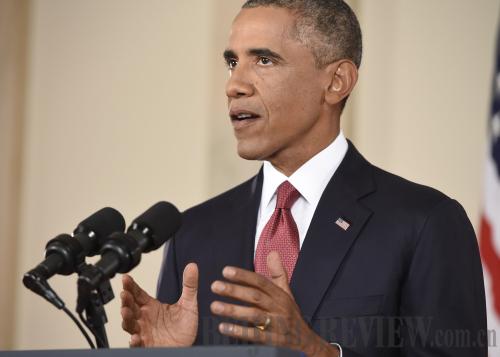|
 |
|
AIR CAMPAIGN: U.S. President Barack Obama delivers a speech on his new strategy targeting IS on September 10 in Washington, D.C. (XINHUA/AFP) |
According to Tian, the United States has not recovered from the pain of the Iraq war. Meanwhile, the Obama administration has been pivoting U.S. strength to the Asia-Pacific region in recent years, so it would not like to devote many troops to the Middle East, Tian added.
The U.S. Government's Middle East policy is often self-contradictory and full of muddled thinking, Wang Jinglie, a researcher with the Institute of West Asian and African Studies under the Chinese Academy of Social Sciences (CASS), told Beijing Review.
The U.S. Government judges terrorists largely by political factors, Wang said. "If a militant group can represent U.S. interests, it will be regarded as righteous opposition by the U.S. Government. And if it threatens U.S. targets, it will be labeled as a terrorist group," he noted.
In the past, for instance, the U.S. Government took a tolerant attitude toward IS when the Islamic extremism group rose in Syria as a rebel force. But now IS has spun out of U.S. control and begun to threaten U.S. targets, thus becoming a target of attacks by the military superpower.
In addition, Chinese observers have expressed confusion over the definition of "moderate" Syrian rebels, which Obama said the U.S. Government will support.
Over the past three years, Western governments have failed to create a moderate Syrian opposition that they can fully trust, Li said.
Li pointed out that the supposed moderate opposition group known as the Free Syria Army is mixed with terrorists, such as al-Nusra, Syria's al-Qaeda affiliate, and the Islamic Front. The training and arms from Western governments could possibly be handed over to another group of terrorists, resulting in a more complicated situation in the Middle East—much like what they did for bin Laden and his al-Qaeda group in Afghanistan, he warned.
The U.S. Government wants to topple Assad's rule in Syria. However, the failure of democracy in Iraq offers a breeding ground for terrorism. Syria will become another Iraq if the U.S. Government repeats the same mistakes, Wang said.
Military operations can eliminate the twigs and leaves of terrorism, Wang noted, but only economic development and improving people's livelihoods will root out the soil from which terrorists grow.
Anti-terror coalition
In the wake of Obama's call for the formation of an international coalition to defeat IS, U.S. Secretary of State John Kerry has been drumming up support for the plan as he met with Arab leaders in Saudi Arabia and then attended an international conference in Paris on September 16. Representatives from 30 countries and international organizations, including five permanent members of the UN Security Council, along with the EU, Gulf countries and other concerned parties, attended the Paris conference hosted by French President François Hollande. In a joint statement, the participants pledged to help Iraq fight IS militants by all means necessary.
"The U.S. Government hopes other allied countries can shoulder some part of the large expenditures of counter-terror operations," Li said. "A U.S.-led and UN-backed multinational anti-terror coalition is the optimal option for the Obama administration. The coalition can not only tackle IS, but also can cope with other issues related to extremism in the Middle East. That will become an important pillar of the Obama administration's anti-terror strategy in the long term."
According to the statement from the U.S. Central Command, Bahrain, Jordan, Saudi Arabia, Qatar and the United Arab Emirates also took part in or supported the September 23 airstrikes against IS targets.
But the legality of the U.S. bombing militant targets in Syria is still in question. Many Western states no longer recognize the Assad-led Syrian Government as a legitimate authority. In theory, any military action against IS targets in Syria should have been authorized, at minimum, by the UN Security Council.
Soon after Obama's initial announcement of expanding airstrikes in Syria, Damascus protested, saying that any U.S. military operations without its consent would be an act of aggression against Syria's territory and sovereignty.
Following the September 23 attacks, however, the Syrian Foreign Ministry issued a statement saying that it had been informed of the operations beforehand. But Pentagon Press Secretary John Kirby told a briefing in Washington D.C. on the same day that the attacks were not carried out with the coordination and cooperation of the Syrian Government.
"Of course the Syrian administration tacitly approves the airstrikes, otherwise it would have publicly condemned the strikes and declared that such attack is a violation to its sovereignty," Hamdi Abdullah, a political researcher, told Xinhua News Agency. Abdullah said that informing Damascus about the airstrike beforehand has allowed the Syrian Government to avoid confronting the issue of sovereignty violation.
Despite this, Russia insists that international anti-terror moves should be carried out within the framework of international law.
"[International law] requires not just a formal warning about the strikes but a clear consent of the Syrian Government or the UN Security Council's decision," the Russian Foreign Ministry said in an online statement.
During his visit to Lebanon on September 18, China's Special Envoy to the Middle East Gong Xiaosheng also stressed that "any actions against terrorism must take into consideration the respect of the sovereignty and integrity of any state and we believe there should be no doubts about this issue."
Email us at: baishi@bjreview.com | 